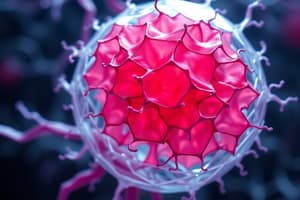Podcast
Questions and Answers
What is the role of the ER in regulating cellular activities?
What is the role of the ER in regulating cellular activities?
- Regulating cytosolic concentrations of calcium (correct)
- Regulating cytosolic concentrations of sodium
- Regulating cytosolic concentrations of magnesium
- Regulating cytosolic concentrations of potassium
How do membranous organelles exchange membrane molecules?
How do membranous organelles exchange membrane molecules?
- Through both lateral diffusion and transport vesicles (correct)
- Neither through lateral diffusion nor transport vesicles
- Only through transport vesicles
- Only through lateral diffusion
What is the primary function of the retrograde pathway?
What is the primary function of the retrograde pathway?
- Delivering newly synthesized molecules to their destination
- Synthesizing new molecules
- Recycling membrane molecules dispersed by transport processes (correct)
- Breaking down old molecules
Which of the following is NOT a part of the endomembrane system?
Which of the following is NOT a part of the endomembrane system?
What is the primary function of the anterograde pathway?
What is the primary function of the anterograde pathway?
Which of the following is a function of the ER?
Which of the following is a function of the ER?
What is the function of aquaporins in the plasma membrane?
What is the function of aquaporins in the plasma membrane?
What type of proteins are often involved in cell wall interactions and synthesis?
What type of proteins are often involved in cell wall interactions and synthesis?
What is the main function of the endoplasmic reticulum (ER) in plants?
What is the main function of the endoplasmic reticulum (ER) in plants?
What is the name of the strands that form between the protoplast and cell wall during cold acclimation?
What is the name of the strands that form between the protoplast and cell wall during cold acclimation?
What type of proteins are involved in transmembrane activities and are often glycosylated?
What type of proteins are involved in transmembrane activities and are often glycosylated?
What is the function of the nuclear envelope in relation to the ER?
What is the function of the nuclear envelope in relation to the ER?
What is the result of increasing the number of Hechtian strands during cold acclimation?
What is the result of increasing the number of Hechtian strands during cold acclimation?
What is the function of the ER in lipid synthesis?
What is the function of the ER in lipid synthesis?
What are the two basic types of membrane proteins according to the original fluid‐mosaic membrane model?
What are the two basic types of membrane proteins according to the original fluid‐mosaic membrane model?
What is the function of the plasma membrane in terms of molecule transport?
What is the function of the plasma membrane in terms of molecule transport?
What type of connections do adjacent plant cells have?
What type of connections do adjacent plant cells have?
What is the difference in pressure between plant and animal cells?
What is the difference in pressure between plant and animal cells?
What is the function of plasmodesmata?
What is the function of plasmodesmata?
What type of membrane proteins are attached to the bilayer by lipid tails?
What type of membrane proteins are attached to the bilayer by lipid tails?
What is the function of the plasma membrane in terms of cell wall molecules?
What is the function of the plasma membrane in terms of cell wall molecules?
What type of connections do adjacent animal cells have?
What type of connections do adjacent animal cells have?
Study Notes
Cellular Compartments
- The endoplasmic reticulum (ER) plays a critical role in regulating cytosolic calcium concentrations, which influence many cellular activities.
- The ER gives rise to the endomembrane system, which includes membranous organelles that exchange molecules through lateral diffusion or transport vesicles.
Endomembrane System
- The endomembrane system consists of membranous organelles that exchange membrane molecules through lateral diffusion or transport vesicles.
- The principal membrane systems connected in this manner include the nuclear envelope, ER, Golgi, trans-Golgi network, multivesicular body, plasma membrane, vacuole, and transport/secretory vesicles.
Membrane Traffic
- All membranes of the endomembrane system are connected by anterograde (forward) and retrograde (backward) traffic.
- The anterograde pathway delivers newly synthesized molecules to their destination, while the retrograde pathway recycles membrane molecules to their site of origin.
Plasma Membrane
- The plasma membrane forms the outermost boundary of the living cell and functions as an active interface between the cell and its environment.
- Plasma membrane proteins serve a variety of functions, including transporters, signal receptors, and proteins involved in cell wall interactions and synthesis.
- Most plasma membrane proteins involved in these transmembrane activities are of the integral type, often forming larger complexes with peripheral proteins.
Hechtian Strands
- Hechtian strands are specialized structures that increase in number during cold acclimation, suggesting that they help protect protoplasts from freeze-induced dehydration.
Endoplasmic Reticulum (ER)
- The ER is the most extensive, versatile, and adaptable organelle in eukaryotic cells, consisting of a 3D network of continuous tubules and flattened sacs.
- In plants, the principal functions of ER include synthesizing, processing, and sorting proteins targeted to membranes, vacuoles, or the secretory pathway.
Membrane Proteins
- Membrane proteins associate with lipid bilayers in many different ways, including peripheral and integral proteins, as well as fatty acid-linked, prenyl group-linked, and phosphatidylinositol-anchored proteins.
Plasmodesmata
- Plasmodesmata are membrane tubes that cross cell walls and provide direct channels of communication between adjacent cells, forming a physically continuous plasma membrane.
- In contrast, animal cells have separate plasma membranes and communicate through protein channels known as gap junctions.
Studying That Suits You
Use AI to generate personalized quizzes and flashcards to suit your learning preferences.
Description
Learn about the role of Endoplasmic Reticulum (ER) in regulating cytosolic calcium concentrations and its relationship with the endomembrane system, including membranous organelles and transport vesicles.



